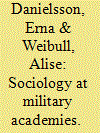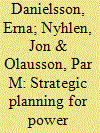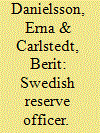|
|
|
Sort Order |
|
|
|
Items / Page
|
|
|
|
|
|
|
| Srl | Item |
| 1 |
ID:
083736


|
|
|
|
|
| Publication |
2008.
|
| Summary/Abstract |
This article illustrates the role of sociology at the Swedish military academies. Finding a suitable balance between theoretical and practical education seems to have been a major thread in Swedish officer education from the eighteenth century to the present day. The emphasis has been on education that is closely linked to military war positions, with extensive elements of combat planning and carrying out military operations. But as tasks have changed, areas such as leadership and organizations have become more important, and the positions of sociological theories and perspective have gradually increased. The belief put forward here is that the demand for sociology will increase for two reasons: the current struggle to make Swedish officer education more university-like and, more important, the need for sociological knowledge that will grow the more the Defense Forces will be engaged in the international arena.
|
|
|
|
|
|
|
|
|
|
|
|
|
|
|
|
| 2 |
ID:
171397


|
|
|
|
|
| Summary/Abstract |
Electricity is critical to almost all other critical infrastructure. Disturbance in the power supply would likely have devastating effects on all areas in society. Assurance of electricity to vital societal functions requires policies to manage power shortages. Such policies exist in only a handful of countries. This study focuses on one of those countries. In Sweden, the policy for power shortages, Styrel, includes all levels of society, all responsible institutions, and expert organisations. The policy is governed from the top down. We are primarily interested in how Styrel affects municipalities in their planning processes and supports decision making at the local level. The study is an interview study with key informants at the municipal level. The results show that the policy is supportive under certain conditions, depending on how the actors carried out previous processes. Lack of knowledge and support, and time pressure, characterise the process, although participants also have a sufficiently positive attitude to allow a more relaxed method of handling the process. The study provides insights on challenges that municipalities must manage in their work with policies for critical infrastructure protection.
|
|
|
|
|
|
|
|
|
|
|
|
|
|
|
|
| 3 |
ID:
104082


|
|
|
|
|
| Publication |
2011.
|
| Summary/Abstract |
The aim of this study is to examine the reserve force's role in and contribution to the new Swedish expeditionary armed forces. Survey data were obtained from 418 reservists. The results show that reserve officers are well educated and hold high positions in the civil society. According to the reserve officers themselves, the Armed Forces do not ask for their nonmilitary competence. The discontent with this situation is greater among the younger reservists as opposed to the older ones. Four different opinions on the need for the reserve officers are suggested. First, reserve officers are requested to fill vacancies, that is, a volume regulator. Second, the reserve officers are needed because they have unique competences other than military that are used by the armed forces. Third, reserve officers are needed from an economic point of view. Finally, reserve officers contribute to the civil-military relationship. However, when using a framework intended for regular officers, the contribution of the reserve officers' civil professional competence has not been recognized.
|
|
|
|
|
|
|
|
|
|
|
|
|
|
|
|
|
|
|
|
|